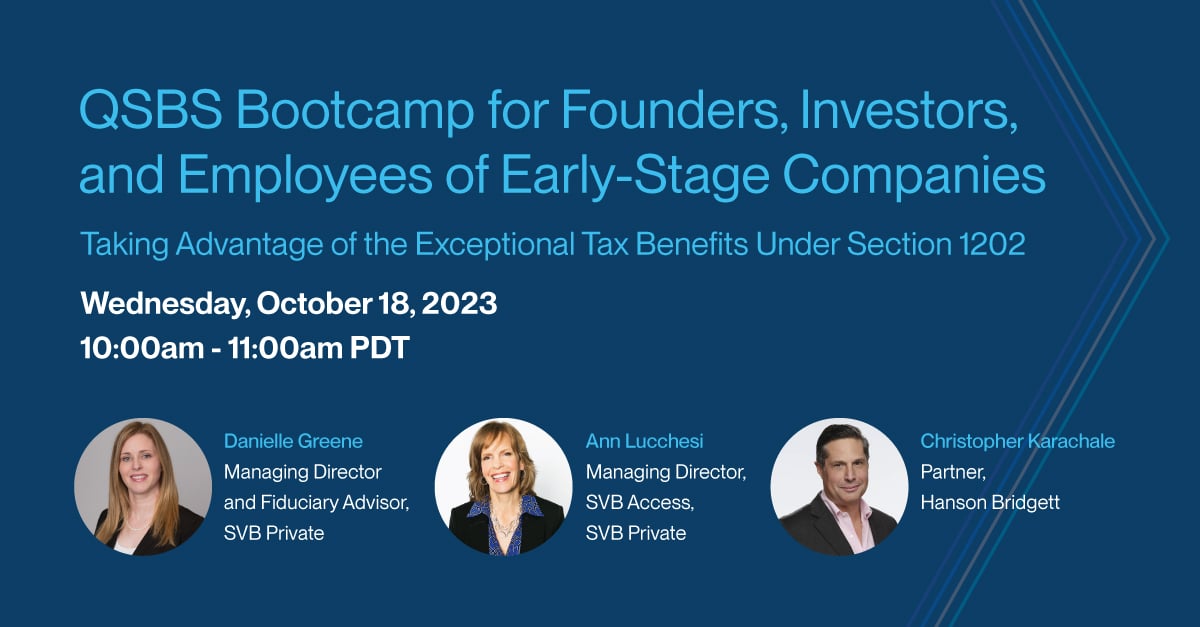With the tax season underway, it’s easy to get overwhelmed by the many details involved in preparing your taxes. That’s why it’s important to remember that even if you’ve delegated your income tax preparation to a tax professional, it’s worth checking in to see if you’ve provided them all the documentation they need to successfully prepare your return.
For innovation economy leaders like yourself, it’s also a great opportunity to take the time to review your tax and savings strategies with your tax professional to ensure that you are pursuing the right path to achieve your financial goals.
A quick phone call or email now can help you avoid a last-minute scramble and the hassle (and expense) of having to file an amended return down the road.
1. Know when to expect your 2023 tax forms
Unless an extension of time has been granted, the table below shows some of the common tax forms and when you should receive them.
|
Form Number and Name |
Shows |
You should receive by |
|
W-2 |
Wages from employment |
January 31 |
|
K-1 |
Share of partnership income |
March 15 / Sept. 16 if Form 1065 has been extended |
|
K-1 |
Shares of fiduciary income |
April 15 / Sept. 30 if Form 1041 has been extended |
|
SSA-1099 |
Social Security benefits |
January 31 |
|
1099-R |
Distributions from retirement plans, pensions and annuities |
January 31 |
|
1099-Misc |
Miscellaneous Income |
January 31 or February 15 (Substitute Payments in Lieu of Dividends or Interest and Gross Proceeds Paid to an Attorney are due to recipients by February 15) |
|
1099-NEC (new form) |
Nonemployee Compensation |
January 31 |
|
1099-DIV |
Income from investment dividends or distributions |
January 31 |
|
1099-INT |
Interest earned from bank, investment accounts |
January 31 |
|
1099-G |
State and local tax refunds, unemployment compensation |
January 31 |
|
1099-B |
Proceeds from broker and barter exchange that summarizes the proceeds of all stock transactions |
February 15 |
|
1098 |
Mortgage interest paid |
January 31 |
2. Don't forget the Qualified Small Business Stock (QSBS) exemption
Section 1202 of the Internal Revenue Code, commonly referred to as the QSBS exemption, enables founders, angel investors, or employees of successful early-stage companies to protect up to $10 million (or 10 times their adjusted cost basis, whichever is greater) from federal taxes.
To take advantage of this exemption, you must have held your stock in a qualified small business for at least five years, but the exclusion percentage for which you are eligible depends on when and how you acquired the stock. For a detailed overview at the requirements, take a look at this article: Understanding qualified small business stock & the capital gains exemption.
3. Find out where to get a form that's missing
What if your April tax filing deadline is looming and you still don’t have a form that you need?
-
- Make sure you’re not ahead of the deadline for when the form arrives. Check the chart above.
- Re-check your files, piles, and email. Some forms may have come earlier than you expected and could be buried in an older stack of papers or your email “inbox” or spam folder.
- See if the issuer typically files an extension. If you’re an estate or trust beneficiary or a shareholder, partner, or member of an LLC, LLP, or S corporation, you may need to file for an extension while you wait for your K-1 forms.
- Contact the issuer directly. If you know who issues the form you need, by all means contact them.
- Contact the Social Security Administration for forms SSA-1099 or SSA-1042. These forms can also be obtained online.
- Contact your SVB Private advisor. If you’re not sure where to turn, a good place to start is your SVB Private advisor who can do some of the legwork for you and/or find a substitute form.
4. Learn how to send your tax information quickly and safely
With today’s ever-increasing cyber-criminal activity, educating yourself on the most secure forms of online transacting and communication is critical. Some steps you can take to keep your tax information safe:
-
- Only use your tax professional’s encrypted secure portal to send and receive sensitive documents and anything that contains your social security number.
- Send information and paper forms by Certified Mail with a signature required.
- File your tax returns as soon as possible. Filing early helps you get ahead of the cyber-criminal who tries to file a fraudulent return and collect your refund before you do. If you file first, the fraudulent return will be rejected. Deadlines for filing the most common federal income tax forms are below.
Deadlines for filing tax forms
|
Form Number |
Used to report |
Required IRS filing date: |
|
1040 |
Personal income |
April 15 / Oct. 15 with extension |
|
709 |
Transfers subject to federal gift taxes |
April 15 / Oct. 15 with extension |
|
990 |
Exempt organization income |
May 15 / Nov. 15 with extension (if filed on a calendar-year basis) |
|
1041 |
Estate and trust income |
April 15 / Sept. 30 with extension (if filed on a calendar-year basis) |
|
1065 |
Partnership income |
March 15 / Sept. 16 with extension (if filed on a calendar year basis) |
|
1120S |
S Corporation income |
March 15 / Sept. 16 with extension (if filed on a calendar year basis) |
|
1040-ES |
Quarterly tax payments |
April 15 for first payment |
|
FinCen Form 114 |
Financial interest in or signature authority over foreign financial accounts |
April 15 / Oct. 15 with extension |
-
- Use electronic funds transfer (EFT) from and to your bank for any IRS-related payments or refunds. Please keep in mind that electing to receive your refund via a pre-paid credit/debit card is often targeted by cyber-criminals.
As you move forward with your tax professionals on filing your 2023 returns, it is important to actively engage them in discussions concerning your tax and savings strategies for 2023 and beyond. While there is still uncertainty concerning future tax legislation, it is still vital that you engage in discussions as to your future planning.
Your SVB Private team is available to help you navigate questions and concerns regarding tax considerations, filing deadlines and other information in this article.
Source: https://www.efile.com/tax-day-deadlines/ and https://www.irs.gov
















